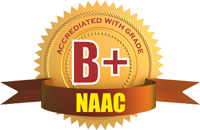1. Pursuit for quality education- We align students with the emerging trends in education.
2. Instil honesty and ethical values-The institution facilitates global learning experience with a local perspective.
3. Research and technical improvisation- We provide conducive ambience for research.
4. Entrepreneurship and innovation-We encourage new ideas and support start-up innovations.
5. Leadership and social responsibilities-We inculcate meticulous working culture and imbibe fairness and transparency in the students so that they are built up as strong future leaders.
Long Term Goals
1. To increase the research appraisal of faculties in every department.
2. To have collaboration with other institutes for higher studies.
3. To have collaboration with national/international firms for placements.
4. To enhance digital learning for students and staff, and to encourage self-learning.
5. To establish an Incubation centre at the campus.
Short Term Goals
1. To get recognition for Research Centre from VTU.
2. Get leased line for uninterrupted internet facility campus-wide.
3. To obtain accreditation from NAAC/NBA.
4. To implement Enterprise Resource Planning in all sectors.
5. Initiate Student Mentoring System.
SWOC
Strength:
1. This is the first Engineering College in the district and enjoys good social acceptance.
2. The Institution has well experienced long standing staff members.
3. It has ICT enabled classrooms with excellent computing and internet facilities.
4. Online library resource is made available to students and staff through remote access.
5. The Institution has a registered and functional Alumni Association.
6. It is the only college in the district offering PG Course-MBA and Research Program in Engineering stream.
7. The institute render Civil Consultancy services which is ISO certified
8. Increased girls strength indicates more healthy environment of the institution.
9. The college student has secured First Place in the University Exams for four consecutive semesters
Weakness:
1. Industry institute interaction is active but mediocre.
2. Lack of exposure of students to the industry work culture due to less technically related industries in and around the city.
3. Funding of projects is feeble.
4. Lack of diversity among the staff members.
5. Staff with doctorates are minimum.
Opportunity:
1. Students are encouraged for entrepreneurship.
2. Encouragement to faculties for upgrading their qualification.
3. Enhancement of research and consultancy services.
4. Improvement in revenue generation through industry and research projects.
5. Providing consultancy services with state of art technologies.
6. Keeping the staff in pace with the present pedagogy and research culture.
7. Getting accreditation as a mark of quality education.
Challenge:
1. To combat reduced admissions due to increase in number of engineering colleges and decrease in demand for engineering stream.
2. To get sponsors for developmental programs for staff and students.
3. To inculcate research culture among students.
4. To balance expenditure and decreasing revenue.
5. Placements from core engineering related industries and unstable job market demands due to changing technology.
Programme Outcomes - UG
1. Engineering knowledge: Apply the knowledge of mathematics, science, engineering fundamentals, and an engineering specialization to the solution of complex engineering problems.
2. Problem analysis: Identify, formulate, review research literature, and analyze complex engineering problems reaching substantiated conclusions using first principles of mathematics, natural sciences, and engineering sciences.
3. Design/development of solutions: Design solutions for complex engineering problems and design system components or processes that meet the specified needs with appropriate consideration for the public health and safety, and the cultural, societal, and environmental considerations.
4. Conduct investigations of complex problems: Use research-based knowledge and research methods including design of experiments, analysis and interpretation of data, and synthesis of the information to provide valid conclusions.
5. Modern tool usage: Create, select, and apply appropriate techniques, resources, and modern engineering and IT tools including prediction and modeling to complex engineering activities with an understanding of the limitations.
6. The engineer and society: Apply reasoning informed by the contextual knowledge to assess societal, health, safety, legal and cultural issues and the consequent responsibilities relevant to the professional engineering practice.
7. Environment and sustainability: Understand the impact of the professional engineering solutions in societal and environmental contexts, and demonstrate the knowledge of, and need for sustainable development.
8. Ethics: Apply ethical principles and commit to professional ethics and responsibilities and norms of the engineering practice.
9. Individual and team work: Function effectively as an individual, and as a member or leader in diverse teams, and in multidisciplinary settings.
10. Communication: Communicate effectively on complex engineering activities with the engineering community and with society at large, such as, being able to comprehend and write effective reports and design documentation, make effective presentations, and give and receive clear instructions.
11. Project management and finance: Demonstrate knowledge and understanding of the engineering and management principles and apply these to one’s own work, as a member and leader in a team, to manage projects and in multidisciplinary environments.
12. Life-long learning: Recognize the need for, and have the preparation and ability to engage in independent and life-long learning in the broadest context of technological change.

